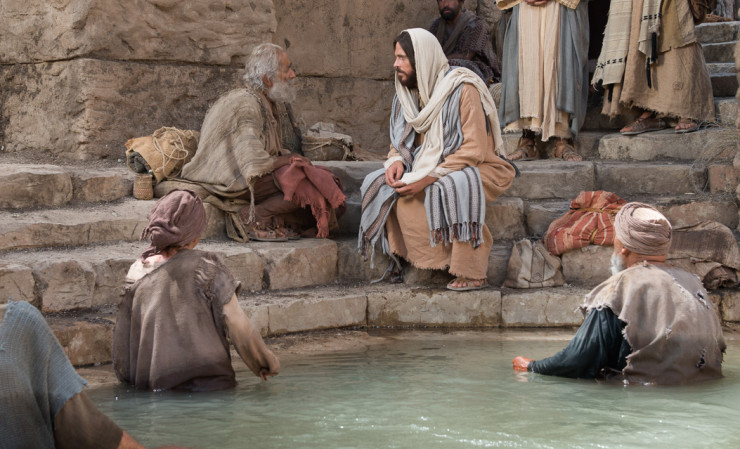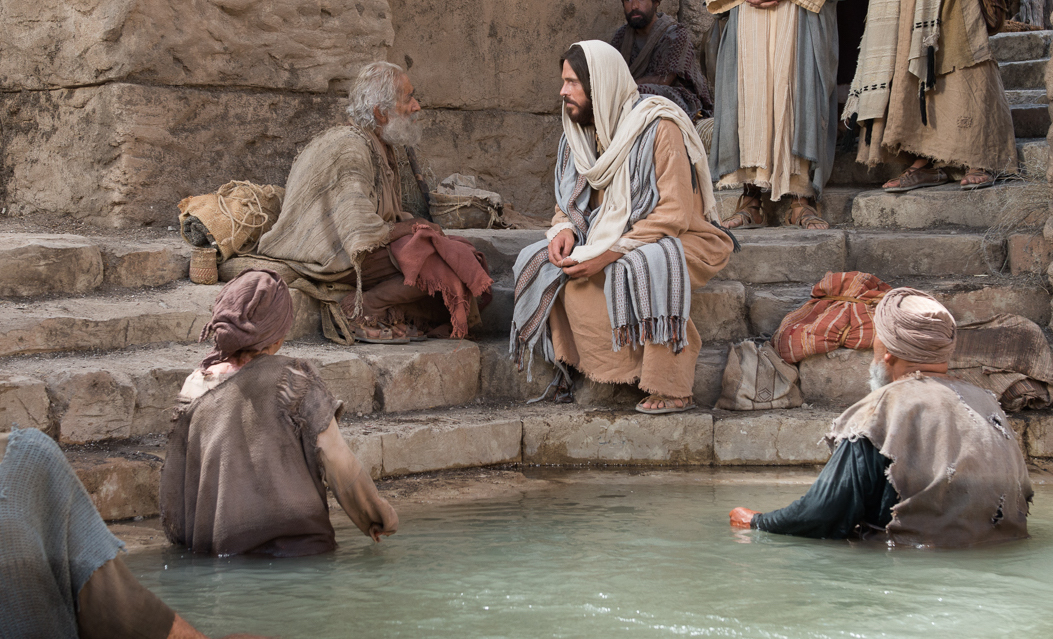Below is a reflection I wrote on yesterday’s Gospel reading, John 5:1-16, for uCatholic.com.
Today’s Gospel offers a strange and enchanting story, one that reads almost like a fairy tale. It begins with a man laying near a large pool called Bethesda. The pool is surrounded by five porticoes (i.e., porches) each filled with ill, blind, lame, and crippled sufferers.
Jesus arrives at the pool and approaches one of them, a man who had been ill for 38 years. He asks, “Do you want to be well?” The sick man responds, “Sir, I have no one to put me into the pool when the water is stirred up; while I am on my way, someone else gets down there before me.” The man was referring to the daily stirring of the water, which some believed was caused by an invisible angel dipping into the pool. Custom held that the first person who entered the stirring water would be healed of disease, but nobody after him.
Jesus has little time for those games. He simply says, “Rise, take up your mat, and walk.” He doesn’t wait and order the man to enter the water at precisely the right moment, so he can be first one in, beating everyone else. He just tells him to rise. Immediately the man becomes well. He takes up his mat and walks away healed.
What can we learn from this strange encounter? Well, here’s how St. Augustine read it. The large group of sick people signify the Jews, who were “shut in” by the five books of Moses, represented by the five porticoes around the pool. The porticoes kept people sick and away from the healing waters. Similarly, the Old Law convicted sinners yet it didn’t absolve them. It diagnosed their sickness but offered no cure.
Until, that is, there arrived one who “stirred the waters.” Like the angel who stirred the Bethesda pool, Jesus comes to “stir sinners”—to comfort the afflicted, but also to afflict the comfortable, to stir them in preparation for what he would do on Good Friday.
But there’s another layer to the story. The “stirring waters” ultimately point ahead toward baptism. In fact, in early Christian art, a man was often depicted as rising from the baptismal waters carrying a bed upon his back. The bed first carried the man, but then after baptism, the man carried the bed.
In this colorful encounter, Jesus seems to be saying this: “Don’t jump into that pool and hope for the best. Jump into my pool. My water is not reserved only for the swift and timely. It’s not only for ones who jump in quick, at the right moment, and beat everyone else. My healing waters are for all people. You can leap in any time, even now.”
We can swim in his mercy whether we’ve been sick for minutes or decades. It doesn’t matter if we’re crippled or addicted, defeated or shamed, lost or helpless. The pool is always open, the waters are always stirred.
You don’t have to be fast. You don’t have to be punctual. You don’t have to beat others to the draw.
You only have to choose the right pool and swim.
“That water [at the pool of Bethesda] was moved once a year; this water of the Church’s baptism is always ready to be moved. That water was moved only in one place; this water is moved throughout the entire world. Then an angel descended; now it is the Holy Spirit. Then it was the grace of the angel; now it is the mystery of the Trinity. That water cured only once in a year; this water saves people every day. That water healed the body; this water heals both body and soul. That water healed a person’s health; this heals from sin. There, the body was only healed of its infirmities; here, body and soul are freed from sin. There, many who were weary lay sick at that water because it only cured one person a year. No one will be left lying sick here where the waters of baptism are, if they resolve to come and be healed.”
— Chromatius of Aquileia, 4th century


